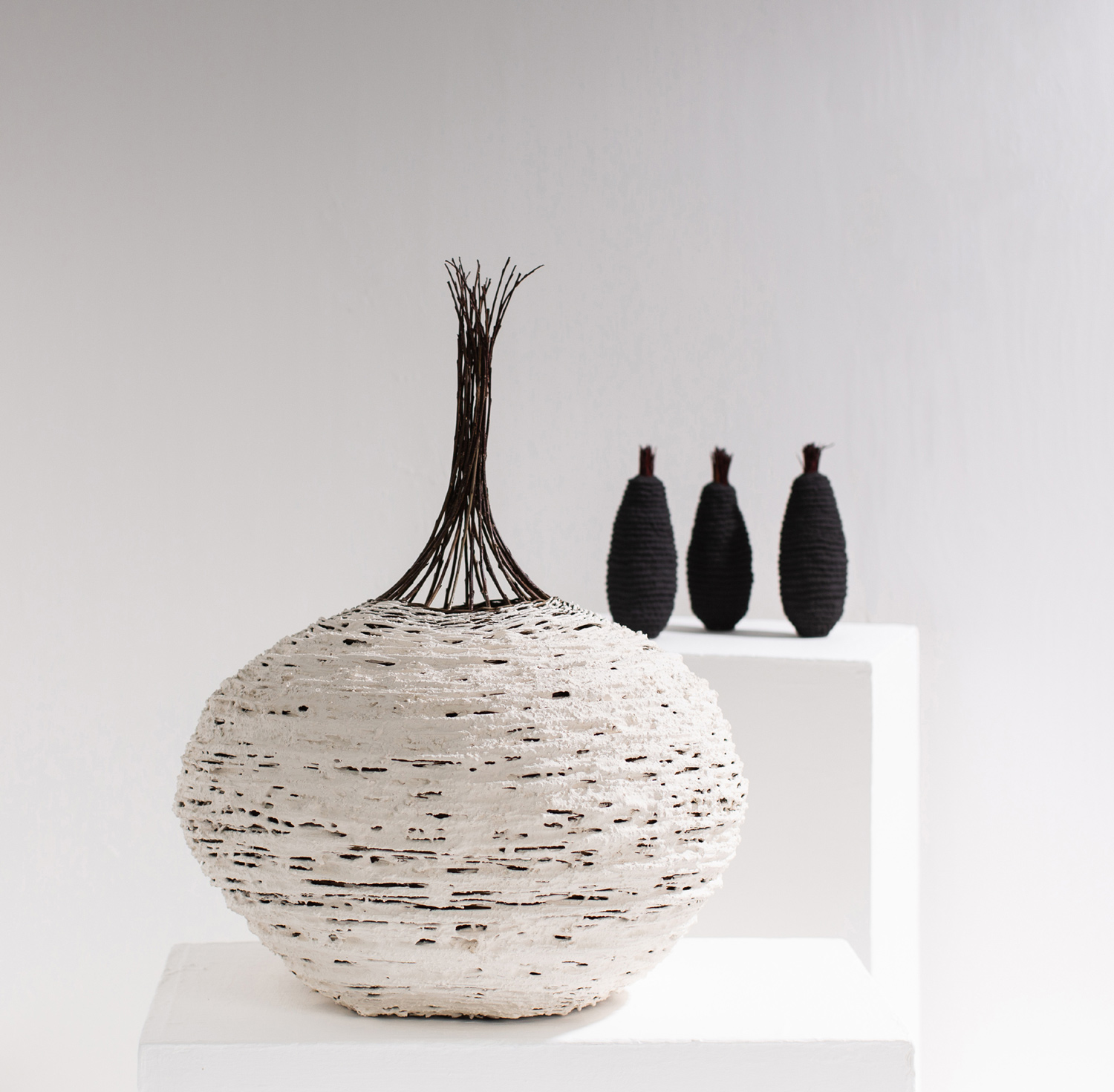
Chalk Seedpod and Tall Seeds
Caroline was born in London. Her childhood was spent in Iran followed by university in London, Birmingham and Oxford. She worked for 30 years in London and Dorset as a Landscape Architect/Urban Designer until 2013 while establishing herself as an acclaimed artist and maker. Public sector projects as an architect included riverside walks, seaside promenades, parks and public squares. Caroline first exhibited her art practice in 2001 and both public and private commissions followed.
Caroline makes both woven and clay and wood sculptures which are strongly influenced by natural form, containment and movement. They are in essence about latent and potential energy; energy within the soil and earth transformed within seeds and the emerging growth.
Woven forms are based on organic seedpod forms and vessels and the importance of respecting the character and properties of the materials used is paramount. The tips of the stem, the catkins and buds are left exposed to suggest fragility and transience. Caroline uses coppiced material in her woven pieces as this reflects her aim to be as carbon neutral as possible.
The coppicing of woodland trees is an ancient and traditional craft that ensures that the tree produces a renewable crop of stems either annually for example with willow or on a seven year rotation with hazel. Caroline’s own small coppice is cut annually in the winter to provide willows and dogwoods of varying natural colours and includes several unusual hybrids some of which can grow up to 3 metres tall in one season. The harvested material is then allowed to dry out over several months and then is soaked in water for up to two weeks so it is pliable enough to weave. Caroline now uses mainly birch stems in her woven pieces which are from birch saplings cut down annually as part of the Dorset Heathland Management Programme. The birch tree also known as Lady of the Woods, is a pioneer species which spreads easily by self seeding. This programme is an essential part of maintaining valuable Dorset heathland habitats by clearing young self sown birch trees and also in order that the historic Hardyesque landscape survives.
Current explorations have involved the use of both clay and wood in creating abstract sculptural forms suggestive of seeds emerging from the earth. The added stems suggest sprouting, green shoots and windblown aids to dispersal. The materials used include stoneware clay; local clay slips; willow and birch ash glazes and a variety of coppiced stems.
Other recent recurring themes in Caroline’s work include explorations into ideas of geological layers, land and form which were initiated after a commission along the Wessex Ridgeway in 2008. The idea of land suggesting and sometimes revealing what is underneath is translated using natural materials such as clay, chalk, stems and leaves.
Caroline’s practice has always been about her connection to nature’s seasonal shifts and the pandemic further heightened and reinforced her sustainable approach. Her making is slow, seasonal and meditative: the growing and gathering of coppiced material; the weaving of layers; the hand coiling of the clay.
Recent exhibitions have included Make Hauser & Wirth, Somerset 2019; Collect London with Contemporary Applied Arts at the Saatchi Gallery 2019; and Crop, Crafted Collectables, Broken Beauty at Collect, and Outside In all with Sarah Myerscough Gallery London 2019- 2021; Collect London with The New Craftsmen Gallery, London 2023 and Hope at Sladers Yard 2023. A solo exhibition land-line-form was held at The Crafts Study Centre, UCA, Farnham in 2014.
In 2010 several pieces were purchased for the public collection at the Wellbeing Centre, Bournemouth University, Dorset.
Professional memberships include Contemporary Applied Arts London, Make South West, Axis, Dorset Visual Arts, Making Dorset, Landscape Institute

Caroline Sharp brings a quiet, discerning poise to her work. Her sculpture and sculptural vessels take the natural world as a starting point. The air still breathes through this craft, a reminder of both transience and permanence.
PROFESSOR SIMON OLDING, LATE DIRECTOR, THE CRAFTS STUDY CENTRE, FARNHAM
We are delighted to discuss commissions for Caroline Sharp’s work. For more information please contact Anna Powell on 01308 459511 or email: gallery@sladersyard.co.uk

Sladers Yard
West Bay Road
West Bay, Bridport
Dorset DT6 4EL
gallery@sladersyard.co.uk
Tel. 01308 459511
© Sladers Yard 2024
Café Sladers
Licensed Restaurant
Events
Information
Weddings and Parties
café@sladersyard.co.uk
Site by FER
Sladers Yard
West Bay Road
West Bay, Bridport
Dorset DT6 4EL
gallery@sladersyard.co.uk
Tel. 01308 459511
Café Sladers
Licensed Restaurant
Events
Information
Weddings and Parties
café@sladersyard.co.uk
© Sladers Yard 2024. Site by FER.